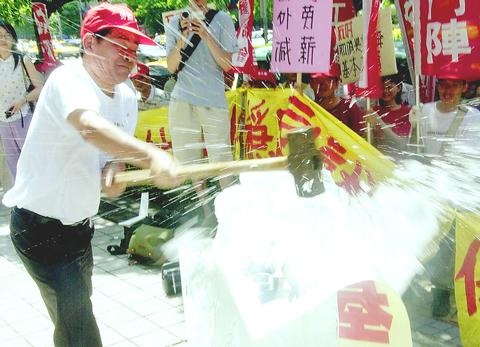A panel group under the Economic Development Advisory Conference has decided that a proposal to move to an hourly wage system is simply to hot to handle.
The proposal, called "no work, no pay," would have meant a huge reduction in pay for the nation's workers.
Labor groups were opposed to the measure because workers wouldn't receive compensation for their days off, as they do under the present system.

PHOTO: LIN CHENG-KUNG, TAIPEI TIMES
In addition, the labor panel said the minimum wage of NT$15,840 for both foreign and local workers should be kept. There were proposals earlier to do away with the wage guarantee.
"It's very difficult for one to survive on the current monthly minimum wage of NT$15,840," said Lin Hui-kwung (林惠官), president of the Chinese Federation of Labor and a participant on the employment panel. "Some workers have to support families on these wages."
Pai Cheng-sheng (
"Besides, if workers lack purchasing power, how can economic development be ensured?" Pai said.
Still, while the panel has taken a hands-off approach to the minimum wage for now, the group said it would urge the Council of Labor Affairs to consider adjusting it in the future.
But no specific proposal as to how the wage should changed was put forth.
For foreign workers, the panel put its weight behind a Council of Labor Affairs proposal to deduct food and rent allowances from their paychecks.
Chen Chu (
The government hopes to implement the plan in September, when NT$2,500 per month will be deducted from workers' paychecks, an amount that will eventually rise to NT$5,000.
By far the issue that had caused the biggest brouhaha yesterday was the proposal to move to an hourly pay system.
In January, a revised version of the Labor Standards Law was implemented, reducing working hours from 48 per week to 84 hours per fortnight.
Because workers are paid for their days off, the change meant that employees were getting an additional six paid hours off per week -- in effect a back-door pay raise.
To avoid giving workers more time off for the same amount of pay, some companies proposed moving to the hourly system.
Chen yesterday said she supported the idea, saying that it was an international trend.
But she later denied, however, that the council supported the shift after her comments angered labor movement officials.

CHAOS: Iranians took to the streets playing celebratory music after reports of Khamenei’s death on Saturday, while mourners also gathered in Tehran yesterday Iranian Supreme Leader Ayatollah Ali Khamenei was killed in a major attack on Iran launched by Israel and the US, throwing the future of the Islamic republic into doubt and raising the risk of regional instability. Iranian state television and the state-run IRNA news agency announced the 86-year-old’s death early yesterday. US President Donald Trump said it gave Iranians their “greatest chance” to “take back” their country. The announcements came after a joint US and Israeli aerial bombardment that targeted Iranian military and governmental sites. Trump said the “heavy and pinpoint bombing” would continue through the week or as long

TRUST: The KMT said it respected the US’ timing and considerations, and hoped it would continue to honor its commitments to helping Taiwan bolster its defenses and deterrence US President Donald Trump is delaying a multibillion-dollar arms sale to Taiwan to ensure his visit to Beijing is successful, a New York Times report said. The weapons sales package has stalled in the US Department of State, the report said, citing US officials it did not identify. The White House has told agencies not to push forward ahead of Trump’s meeting with Chinese President Xi Jinping (習近平), it said. The two last month held a phone call to discuss trade and geopolitical flashpoints ahead of the summit. Xi raised the Taiwan issue and urged the US to handle arms sales to

State-run CPC Corp, Taiwan (CPC, 台灣中油) yesterday said that it had confirmed on Saturday night with its liquefied natural gas (LNG) and crude oil suppliers that shipments are proceeding as scheduled and that domestic supplies remain unaffected. The CPC yesterday announced the gasoline and diesel prices will rise by NT$0.2 and NT$0.4 per liter, respectively, starting Monday, citing Middle East tensions and blizzards in the eastern United States. CPC also iterated it has been reducing the proportion of crude oil imports from the Middle East and diversifying its supply sources in the past few years in response to geopolitical risks, expanding

Pro-democracy media tycoon Jimmy Lai’s (黎智英) fraud conviction and prison sentence were yesterday overturned by a Hong Kong court, in a surprise legal decision that comes soon after Lai was jailed for 20 years on a separate national security charge. Judges Jeremy Poon (潘兆初), Anthea Pang (彭寶琴) and Derek Pang (彭偉昌) said in the judgement that they allowed the appeal from Lai, and another defendant in the case, to proceed, as a lower court judge had “erred.” “The Court of Appeal gave them leave to appeal against their conviction, allowed their appeals, quashed the convictions and set aside the sentences,” the judges